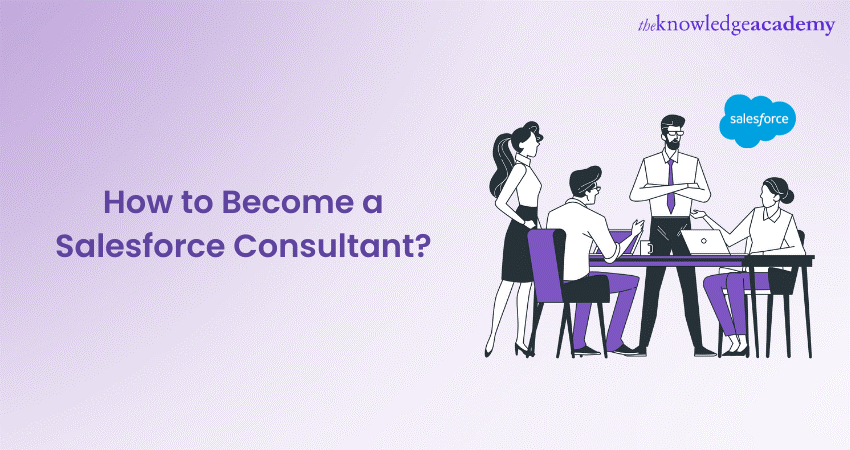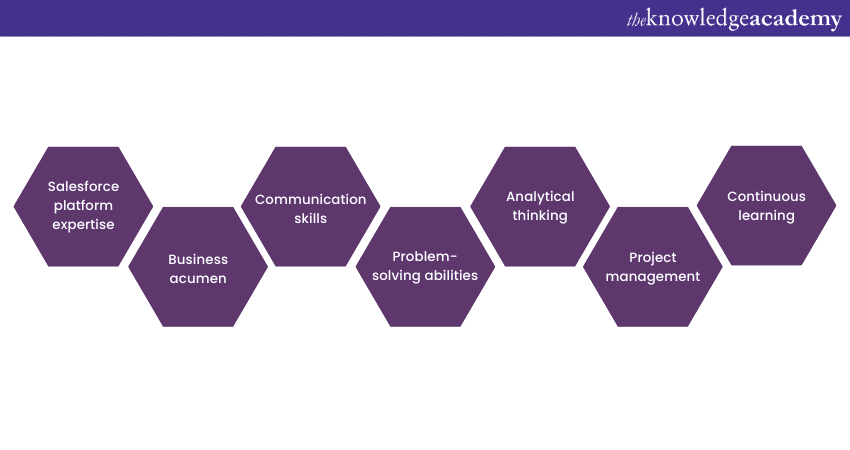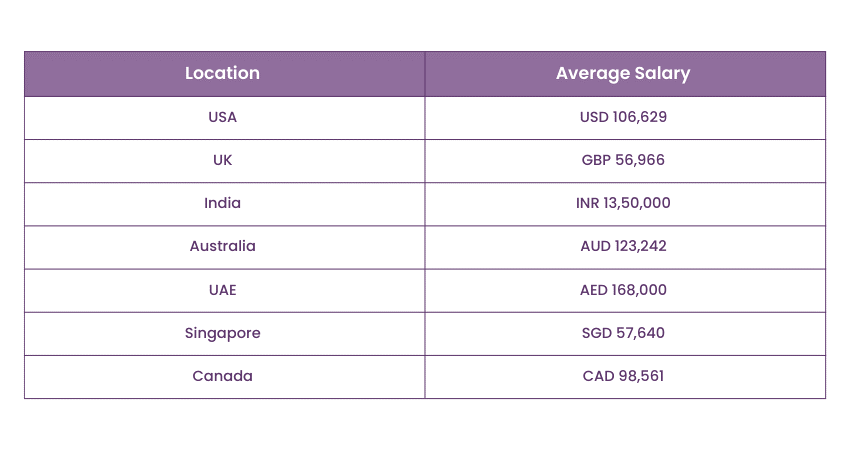We may not have the course you’re looking for. If you enquire or give us a call on +47 80010068 and speak to our training experts, we may still be able to help with your training requirements.
Training Outcomes Within Your Budget!
We ensure quality, budget-alignment, and timely delivery by our expert instructors.

If you have a passion for technology, a knack for problem-solving, and a desire to help businesses optimise their operations, then there might be a perfect career path for you. A role as a Salesforce Consultant is one of the most coveted roles out there in the Customer Relationship Management (CRM) software market.
This blog will guide one through the essential steps to becoming a successful Salesforce Consultant, from acquiring the necessary skills to landing your dream job.
Table of Contents
1) What does a Salesforce Consultant do?
2) Skills Necessary to Become a Salesforce Consultant
3) The Career path of a Salesforce Consultant
4) Salesforce Consultant salary
5) Conclusion
What does a Salesforce Consultant do?
A Salesforce Consultant plays a crucial role in helping businesses leverage the power of the Salesforce platform to achieve their goals and streamline their operations. As a consultant, they are primarily responsible for understanding clients' requirements, analysing their business processes, and providing tailored solutions using Salesforce's extensive suite of products and tools.

The duties and responsibilities of a Salesforce Consultant can vary depending on the certain needs of the client and the project at hand. However, here are some key aspects of their role:
a) Requirement gathering: A consultant collaborates closely with clients to gather their requirements and understand their unique business challenges. They conduct interviews, workshops, and discussions to accurately capture the client's needs, goals, and pain points.
b) Solution design: Based on the gathered requirements, the consultant designs and customises Salesforce solutions to meet the client's specific needs. They map out the business processes, configure Salesforce features, and integrate various components to create a comprehensive solution.
c) System implementation: Once the solution design is finalised, the consultant takes charge of implementing the Salesforce system. This involves configuring the platform, setting up user access and security, creating custom objects and fields, and designing workflows and automation.
d) Data migration and integration: In many cases, Salesforce Consultants are responsible for migrating existing data from legacy systems to Salesforce. They ensure the smooth transfer of data, maintain data integrity and integrate Salesforce with other third-party systems if required.
e) User training and support: After implementing the Salesforce system, the consultant provides user training and support to ensure that the client's employees can effectively utilise the platform. They conduct training sessions, create documentation and tutorials, and address any issues or queries that arise.
f) Continuous improvement: Consultants continuously monitor the performance of the implemented system and identify areas for improvement. They work closely with clients to gather feedback, analyse system usage, and recommend enhancements or additional features to optimise the Salesforce implementation.
g) Salesforce administration: Depending on the client's requirements, a Salesforce Consultant may also take on administrative tasks such as managing user access, creating and maintaining reports and dashboards, and monitoring system performance.
Become a Salesforce Admin and manage your CRM like a pro with our Salesforce Admin Course.
Skills Necessary to Become a Salesforce Consultant
Here are the essential skills required to excel in the role of a Salesforce Consultant:

a) Salesforce platform expertise: As a consultant, it is crucial to have a deep understanding of the Salesforce platform. This includes familiarity with various Salesforce products, such as Service Cloud, Sales Cloud, and Marketing Cloud. You should be proficient in configuring and customising Salesforce, including workflows, automation, data management, and security settings.
b) Business acumen: A consultant needs to possess a strong understanding of business processes and operations. This includes knowledge of sales cycles, customer relationship management, marketing strategies, and other key business concepts. Being able to align Salesforce solutions with business goals and translate client requirements into effective system designs is essential.
c) Communication skills: It is pivotal for consultants to have effective communication skills. You must be able to communicate effectively with clients, gather requirements, and explain complex technical concepts clearly and concisely. Additionally, you should be adept at presenting your ideas, conducting training sessions, and providing ongoing support to clients and end-users.
d) Problem-solving abilities: Salesforce Consultants encounter various challenges and issues during the implementation and optimisation process. Having strong problem-solving skills is crucial for identifying and resolving these issues effectively. You should be able to analyse problems, think critically, and provide innovative solutions that align with the client's requirements and best practices.
e) Analytical thinking: As a consultant, you need to have strong analytical skills to analyse and understand complex business processes. This involves gathering and interpreting data, identifying trends and patterns, and making data-driven recommendations for process improvement. The ability to leverage Salesforce reports and dashboards to derive actionable insights is valuable.
f) Project management: Salesforce Consultants often work on multiple projects simultaneously. Therefore, having project management skills is essential to ensure successful project delivery. This includes the ability to plan, organise, and prioritise tasks effectively, manage timelines and resources, and handle project risks and issues.
g) Continuous learning: The Salesforce ecosystem is constantly evolving, with new updates and features being released on a regular basis. A successful consultant is committed to continuous learning and staying updated with the latest Salesforce releases, best practices, and industry trends. Taking advantage of Salesforce's training resources, participating in webinars, and earning additional certifications demonstrates a dedication to ongoing professional development.
Gain an understanding of how the SOSL language can benefit with the development of programs on Salesforce. Sign up today for Salesforce Developer Training!
The career path of a Salesforce Consultant
The career path of a Salesforce Consultant offers ample opportunities for growth and advancement within the Salesforce ecosystem. It is a dynamic field that provides a clear progression route for individuals who are passionate about leveraging technology to drive business success. Here is an elaboration of the career path of a Salesforce Consultant:
Entry-level Consultant
The journey typically begins as an entry-level Salesforce Consultant. At this stage, individuals may join consulting firms or start their careers within organisations that use Salesforce. They work closely with senior consultants and gain hands-on experience in Salesforce implementation, customisation, and support. This period allows them to develop a solid foundation in Salesforce fundamentals and gain exposure to different industries and business processes.
Specialisation and certification
As consultants gain experience, they have the opportunity to specialise in specific Salesforce domains. This can involve focusing on areas such as Sales Cloud, Service Cloud, Marketing Cloud, or industry-specific solutions. By pursuing specialised certifications offered by Salesforce, such as Salesforce Certified Sales Cloud Consultant or Salesforce Certified Service Cloud Consultant, consultants can demonstrate their expertise in these areas and stand out in the job market.
Senior Consultant
With increased experience and expertise, consultants can progress to senior consultant roles. In these positions, they take on more responsibility in leading Salesforce projects, managing client relationships, and providing strategic guidance. Senior consultants often act as trusted advisors, working closely with clients to understand business objectives and design solutions that align with their goals. They may also mentor and guide junior consultants, sharing their knowledge and experience.
Solution Architect or Technical Architect
Becoming a Salesforce solution architect or technical architect is a typical career progression for those who aspire to take on more technical and strategic roles. Solution architects focus on designing end-to-end solutions that address complex business requirements, leveraging their deep understanding of Salesforce capabilities and best practices. On the other hand, technical architects specialise in architecting and overseeing the technical implementation of Salesforce solutions, ensuring scalability, security, and integration with other systems.
Consulting leadership and management
As consultants gain seniority and experience, they may transition into leadership or management positions within consulting firms or organisations. In these roles, they lead teams of consultants, oversee project delivery, and provide strategic direction to drive business growth. Consulting leaders contribute to business development efforts, cultivate client relationships, and guide the overall consulting practice.
Independent consulting or entrepreneurship
Experienced consultants may choose to venture into independent consulting or start their own consulting firms. This allows them to have more control over their projects, clients, and business direction. They can offer specialised services, build a strong reputation in the industry, and have the flexibility to work on diverse projects with a wide range of clients.
Throughout their career path, Salesforce Consultants are encouraged to continuously update their skills, stay informed about the latest Salesforce releases and features, and pursue advanced certifications. They can also actively participate in the Salesforce community, attend events, and engage in knowledge sharing to stay connected with industry trends and expand their professional network.
Become an expert app builder with the power of the Salesforce platform. Register today for the Salesforce Platform App Builder Training!
Salesforce Consultant salary
Listed below are the salaries for Salesforce Consultants across various countries:

Conclusion
Becoming a Salesforce Consultant requires a combination of technical skills, business acumen, and a passion for helping organisations succeed. By acquiring the necessary certifications, gaining practical experience, building a professional brand, and continuously learning, you can set yourself on a path to a rewarding career in Salesforce consulting.
Enhance your CRM software skills with our comprehensive CRM Training courses!
Frequently Asked Questions
Upcoming Business Skills Resources Batches & Dates
Date
 Salesforce CRM Masterclass
Salesforce CRM Masterclass
Fri 28th Feb 2025
Fri 4th Apr 2025
Fri 27th Jun 2025
Fri 29th Aug 2025
Fri 24th Oct 2025
Fri 5th Dec 2025







 Top Rated Course
Top Rated Course


 If you wish to make any changes to your course, please
If you wish to make any changes to your course, please


